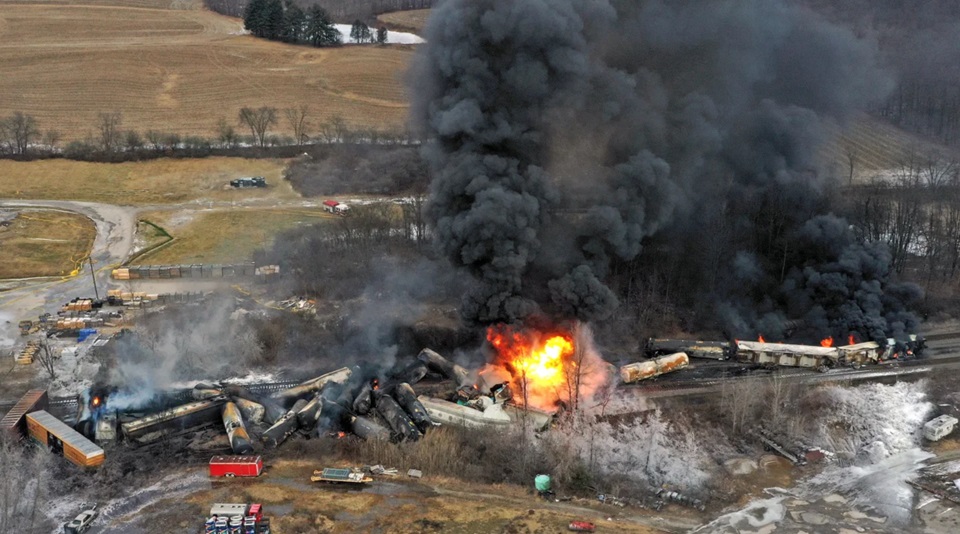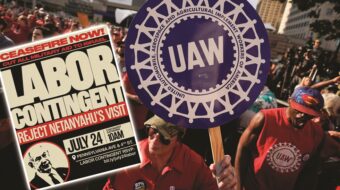
WASHINGTON—A major investigation by the news site ProPublica has—by sifting through thousands of documents, poring over 111 court cases over 15 years about safety issues, and interviewing hundreds of rail workers willing to talk—revealed in detail how the nation’s major freight railroads have put profits before safety, putting workers and communities at risk.
The findings track what the AFL-CIO Transportation Trades Department has said for years. Its president, Greg Regan, has raised the rail safety issue and lobbied and testified often before federal officials and Congress about the safety hazards on the nation’s Class I big freight railroads.
“Rail unions have been outspoken about safety shortcomings, warning of the destruction that can follow accidents or derailments,” Regan and TTD Secretary-Treasurer Sherri Semelsberger said in a September statement, their latest on the issue.
The ProPublica story and an accompanying sidebar make it clear the fight for rail safety and the corporate threat to it is wider than rail workers, TTD, the federal Surface Transportation Board—which regulates the railroads—or communities ranging from East Palestine, Ohio, to Chicago realize.
The report lays out in detail how the Class I freight railroads—in particular CSX, Union Pacific, Burlington Northern Santa Fe, and Norfolk Southern—follow a system of metrics for profit creation which emphasize speed and fast turnarounds for freight trains over safety issues. Norfolk Southern was responsible for the derailment, crash, and leaks which sent a mushroom cloud over East Palestine and toxic chemicals into its streams and area wells. Union workers cleaning up the mess got sick.
Yet the government trusts the railroads to monitor their own safety practices, make fixes, and listen to, not fire, whistleblowers, ProPublica reported. The truth is the opposite.
Or as one supervisor in the nation’s biggest rail yard, in Kansas City, Mo., told a worker four years ago who flagged unsafe freight cars which should have been pulled out for repairs: “We’re a transportation company, right? We get paid to move freight. We don’t get paid to work on cars.”
When Federal Railroad Administration safety inspectors literally blow the whistle on problems, as one did on a stretch of track in the South with rotting rail ties and rusted nails holding them to the rails, they’re overridden by company middle managers who are under orders to move, move, move freight regardless of the risk.
A conscientious rail union worker raised the same issue, demanding a “slow order” of 30 mph, not 60, until the tracks, ties, and nails were replaced. He was written up for complaining.
Pass within 500 feet of homes
In another case, a worker reported a stretch of Southern track hosts long and dangerous oil trains and passes within 500 feet of houses. The risk to kids he heard playing in yards kept the worker up at night. His middle manager replied the point was to move the oil regardless of the risk.
Later, the railroad involved fired the whistleblower, who had also taken his warning to the Occupational Safety and Health Administration. In addition to regulating all industries for job safety and health, OSHA is supposed to be the prime whistleblower protector for all cases.
But OSHA is so backed up that it takes at least a year to order a railroad to fix the problems, after a fine. That’s so long, the whistleblower withdrew his complaint and sued his railroad in federal court. There, extensive testimony revealed the real conditions of the tracks and rejection by railroad middle managers. He won a $1 million settlement, one of three whistleblowers to gain at least that.
In another case, workers warned their railroad for five months of a large rotting tree looming over a curve. The road’s managers ignored them, the six-ton tree fell, and a locomotive coming down the tracks slammed into it, shattering its windshield and injuring two workers. One had to retire on disability. The railroad fired the other two days after the crash. She went into a deep depression.
“The nation saw first-hand the effects of these shortcomings during Norfolk Southern’s catastrophic derailment in East Palestine, Ohio…and the dozens of major derailments that followed,” Transportation Trades’ Regan and Semelsberger said. “Prioritization of profits by freight rail companies and tens of thousands of jobs they eliminated put safety on the back burner and poses a danger to rail workers, customers, and communities.
“No one knows better than front-line workers the risks of working on freight trains and on the tracks. Two-person crews, proper protection of track workers working in the rail right of way, robust train car and locomotive inspections, and more thorough training requirements are bare minimum standards that could help to fortify safety and decrease incidents. We will not stop fighting to raise the bar for rail safety on behalf of workers and the communities they serve.”
ProPublica’s details elated Railroad Workers United, a rank-and-file workers organization uniting members of all 14 rail craft unions. Indeed, the RWU encouraged rail workers who know of other safety hazards to contact the news writing team which assembled the story.
“This in-depth behind-the-scenes look into the rail industry is so well done and so important that we ran it as a Special Bulletin” on its website, RWU said. “Most [workers] will recognize the stories, conditions, and behaviors described here. For many of us, this is the article we have waited our entire railroad career to finally see in print.”
The railroads’ lobby, the Association of American Railroads, responds by touting the measured statistics on safety. The numbers show a flat rate of derailments over the last four years, even as the Class I railroads cut their workforces, including inspectors, by a third in the last nine years.
ProPublica notes the accident numbers don’t count near-misses, trains without workers on them suddenly having brakes fail and roll down tracks, derailments with no injuries, or freight cars with safety issues such as ancient and cracked brakes and axles—as in East Palestine—and more.
Regan summed up the situation in a position paper on freight train hazards issued earlier this year: “Actions by the Class I freight railroads both before and after the” East Palestine “derailment demonstrate they still have no interest in correcting their business practices that put lives and communities at risk every single day.
“Sadly, that is because they are driven by one thing, and one thing only: Generating the most profit possible, regardless of anyone’s wellbeing but their own. It does not matter to them who gets hurt in the process.”
The ProPublica report is at https://www.propublica.org/article/railroad-safety-union-pacific-csx-bnsf-trains-freight
We hope you appreciated this article. At People’s World, we believe news and information should be free and accessible to all, but we need your help. Our journalism is free of corporate influence and paywalls because we are totally reader-supported. Only you, our readers and supporters, make this possible. If you enjoy reading People’s World and the stories we bring you, please support our work by donating or becoming a monthly sustainer today. Thank you!












Comments